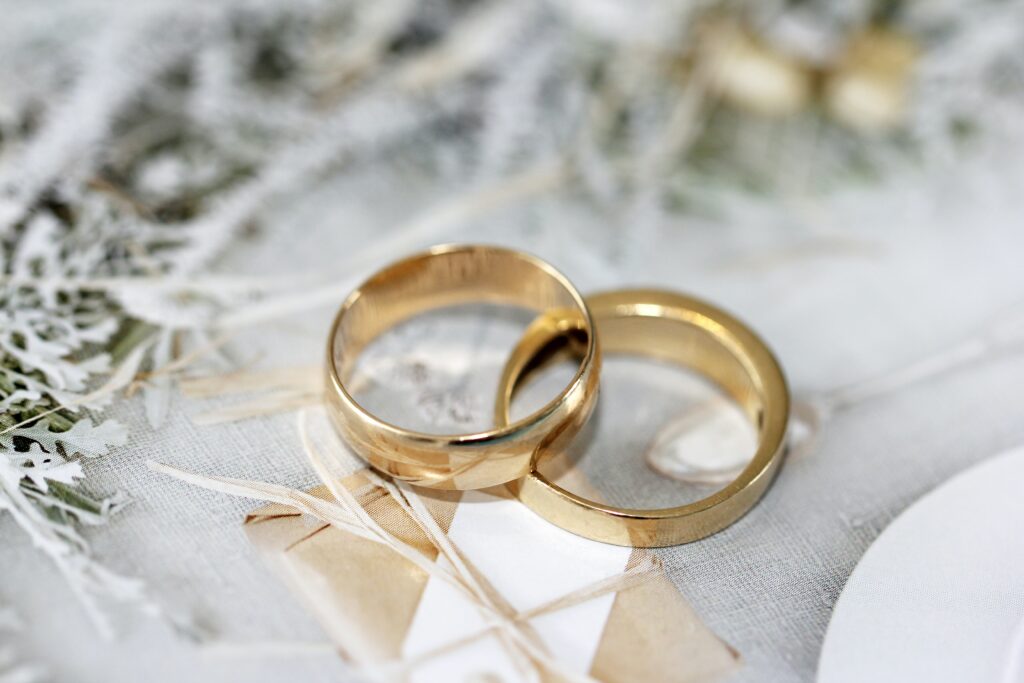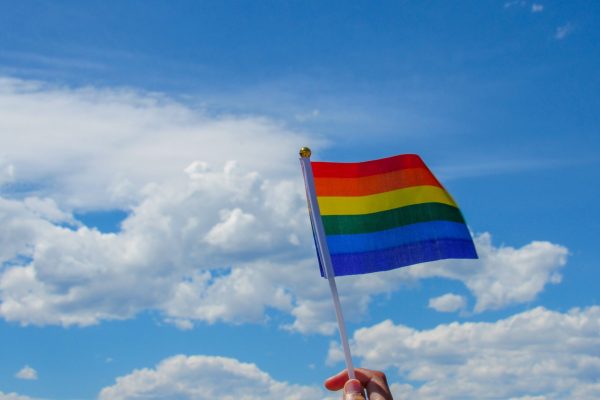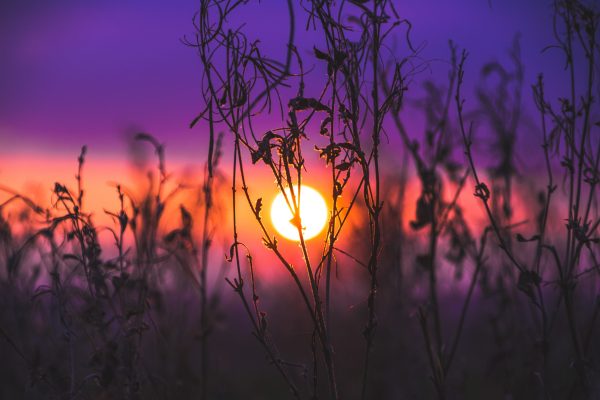This part of the ceremony consists of the recitation of the sheva brakhot, or seven blessings. The following translation is by Rabbi Burt Jacobson.
The Seven Blessings (Sheva Brakhot, or Nuptial Blessings)
בָּרוּךְ אַתָּה אֲדֹנָי אֱלֹהֵינוּ מֶלֶךְ הָעוֹלָם בּוֹרֵא פְּרִי הַגָפֶן
בָּרוּךְ אַתָּה אֲדֹנָי אֱלֹהֵינוּ מֶלֶךְ הָעוֹלָם שֶׁהַכֹּל בָּרָא לִכְבוֹדוֹ
בָּרוּךְ אַתָּה אֲדֹנָי אֱלֹהֵינוּ מֶלֶךְ הָעוֹלָם יוֹצֵר הָאָדָם
בָּרוּךְ אַתָּה יְיָ אֱלֹהֵינוּ מֶלֶךְ הָעוֹלָם, אֲשֶׁר יָצַר אֶת הָאָדָם בְּצַלְמוֹ, בְּצֶלֶם דְּמוּת תַּבְנִיתוֹ, וְהִתְקִין לוֹ מִמֶּנּוּ בִּנְיַן עֲדֵי עַד: בָּרוּךְ אַתָּה יְיָ, יוֹצֵר הָאָדָם
שׂוֹשׂ תָּשִׂישׂ וְתָגֵל הָעֲקָרָה, בְּקִבּוּץ בָּנֶיהָ לְתוֹכָהּ בְּשִׂמְחָה: בָּרוּךְ אַתָּה יְיָ, מְשַׂמֵּחַ צִיּוֹן בְּבָנֶיהָ
שַׂמַּח תְּשַׂמַּח רֵעִים הָאֲהוּבִים, כְּשַׂמֵּחֲךָ יְצִירְךָ בְּגַן עֵֽדֶן מִקֶּֽדֶם: בָּרוּךְ אַתָּה יְיָ, מְשַׂמֵּֽחַ חָתָן וְכַלָּה
בָּרוּךְ אַתָּה יְיָ אֱלֹהֵינוּ מֶלֶךְ הָעוֹלָם, אֲשֶׁר בָּרָא שָׂשׂוֹן וְשִׂמְחָה, חָתָן וְכַלָּה, גִּילָה רִנָּה דִּיצָה וְחֶדְוָה, אַהֲבָה וְאַחֲוָה שָׁלוֹם וְרֵעוּת, מְהֵרָה יְיָ אֱלֹהֵינוּ יִשָּׁמַע בְּעָרֵי יְהוּדָה וּבְחוּצוֹת יְרוּשָׁלָיִם, קוֹל שָׂשׂוֹן וְקוֹל שִׂמְחָה, קוֹל חָתָן וְקוֹל כַּלָּה, קוֹל מִצְהֲלוֹת חֲתָנִים מֵחֻפָּתָם, וּנְעָרִים מִמִּשְׁתֵּה נְגִינָתָם: בָּרוּךְ אַתָּה יְיָ, מְשַׂמֵּחַ חָתָן עִם הַכַּלָּה
Transliteration:
English:
Be Blessed, O Infinite God, the Power and Majesty of all, creating the fruit of the vine.
We bless You now, Havayah, O Sovereign Spirit of the world, for creating the universe to augment Your glory.
Be blessed, O Infinite God, the Power and Majesty of all, for creating the individual.
We bless You now, Havayah, O Sovereign Spirit of the world, for fashioning human beings who reflect the divine, one at their core, complementing each other in their differences. Be blessed, O infinite God, for fashioning woman and man.
May our land be happy and rejoice, as a mother whose children return to her in joy. We bless You now, Havayah, for letting Zion rejoice with her children.
Let these loving friends rejoice. May their joy be a paradise on earth. Be blessed, O Infinite God, for causing this groom and this bride to rejoice.
We bless You now, Havayah, O Sovereign Spirit of the world, for creating joy and happiness, bride and groom, mirth, song, gladness and rejoicing, love and harmony, peace and companionship. O Eternal One, our Boundless Power, may there soon be heard in the cities of the world and in the streets of Jerusalem, voices of joy and gladness, voices of bride and groom, the voices of lovers crying in joy beneath their huppahs, of soulmates shouting at their wedding feasts. Be blessed, O Infinite God, for letting this groom and bride rejoice together.
Used with permission of the author.
The Meaning of the Seven Blessings
At first blush, these blessings do not appear to relate directly to the wedding at hand. Instead, they speak of the creation of man and woman in the Garden of Eden, the return of Jerusalem’s children to the holy city and finally the joy of the bride, groom and wedding guests. What does all this have to do with a wedding?
The wedding, like the huppah which frames it, is a window into a perfect past and a perfect future. We look back to the Garden of Eden and the joy the first couple experienced as they found one another; we look forward to a messianic future in which each person knows perfect love. Most of the time we are too distracted to see this vision of our true humanity. Since Eden, we live in an imperfect world: to quote Anita Diamant, “The Garden was lost, the Temple was destroyed, even God is not whole. Shechinah, God’s feminine self, wanders the earth, cut off, bereaved.” Just as God’s gender is divided, men and women find themselves at odds, sometimes from different planets rather than of a single rib.
At a wedding, however, the bride and groom, in getting married, enable all the assembled guests to see this vision of perfect love, this vision of ourselves as we truly are. That is why everyone wishes one another Mazal Tov (congratulations) at wedding—he shared vision is not only the bride’s and groom’s but belongs to all of us. Perhaps this is also why we cry at weddings.
The sixth blessing refers to the wedding couple as friends. The rabbis thought that friendship was the best basis for a marriage. The same holds true today. Twenty-five years, a couple of kids and a mortgage down the road, it will not be the blush of young beauty nor the fire of early romance that will ground the relationship. The magic will be in sustaining a conversation: is it still interesting to talk to this person after lo, these many years?
Note also how the sixth blessing blesses the bride and groom independently (hattan v’kallah) while the seventh blesses the two together (hattan im ha’kallah). Although some commentators argue that the first blessing represents the bride and groom before they are married and the second, after, a better interpretation sees both blessings as for the new couple. The first speaks of them independently for they will need to maintain their independence, their separateness, even as they come together to build a new family. Marriage is a life-long dance between these poles, but neither extreme—total separateness nor total merger—will succeed.
A Feminist Lens
Many feel that the seven blessings, steeped as they are in history, are perfect just as they are. Others make minor changes, removing the language of adam for mankind or making the oblique reference to womankind in the fourth blessing direct.
A Same-Sex Wedding
The language of the seven blessings is distinctly heterosexual. However, with minor tweaks, they can be rewritten without reference to heterosexuality. The example which follows is from a lesbian wedding:
בָּרוּךְ אַתָּה אֲדֹנָי אֱלֹהֵינוּ מֶלֶךְ הָעוֹלָם בּוֹרֵא פְּרִי הַגָפֶן
Barukh atah adonay eloheynu melekh haolam borey p’ri hagafen.
Blessed are You, our God, Spirit of the world, Creator of the fruit of the vine.
בְּרוּכָה אַתְּ יָהּ אֱלֹהֵינוּ רוּחַ הָעוֹלָם שֶׁהַכֹּל בָּרְאָה לִכְבוֹדָהּ
B’rukha at yah eloheynu ruakh haolam shehakol barah likhvodah.
Blessed are You, our God, Spirit of the world, whose creation is glorious.
בְּרוּכָה אַתְּ יָהּ אֱלֹהֵינוּ רוּחַ הָעוֹלָם יוֹצֶרֶת הָאָדָם
B’rukha at yah eloheynu ruakh haolam yotzeret ha’adam.
Blessed are You, our God, Spirit of the world, Creator of human beings.
בְּרוּכָה אַתְּ יָהּ אֱלֹהֵינוּ רוּחַ הָעוֹלָם אֲשֶׁר יָצְרָה אֶת הָאָדָם בְּצַלְּמָהּ בְּצֶלֶם דְּמוּת תַּבְנִיתָהּ וְהִתְקִינָה לָנוּ מִמֶּנּוּ בִּנְיַן עֲדֵי עַד. בְּרוּכָה אַתְּ יָהּ אֲשֶׁר בַּאֲרָהּ אוֹתָנוּ בְּצַלְּמָהּ
B’rukha at yah eloheynu ruakh ha’olam asher yatzrah et ha’adam bitzalmah b’tzelem d’mut tavnitah v’hitkinah lanu mimeynu adey ad. Brukha at yah asher barah otanu b’tzelmah.
Blessed are You, our God, Spirit of the world, Who shapes humanity in Her image and likeness and enables us to renew creation by nurturing generations to come. Blessed are You, having created us in Your image.
שׂוֹשׂ תָשֵׂשְׂנָה וְתָגֵלְנָה נָשִׁים בְּקִבּוּץ בְּנוֹתֵיהֶן לְתוֹכָן בְּשִׂמְחָה. בְּרוּכָה אַתְּ יָהּ מִשְּׂמֵחָה צִיּוֹן בְּבָנֶיהָ
Sos taseysnah v’taheylnah nashim b’kibutz b’noteyhen l’tokhan b’simkha. Brukha at yah mismeykha tzion b’baneyha.
May women rejoice when their daughters gather in joy. Blessed are You, who gladdens Zion with her children.
שָׂמֵחַ תְּשַׂמְּחִי רֵעוֹת אֲהוּבוֹת כְּשַׂמְּחֵךְ יְצִירֵךְ בְּגַן עֵדֶן מִקֶּדֶם. בְּרוּכָה אַתְּ יָהּ מְשַׂמַּחַת רֵעוֹת וַאֲהוּבוֹת
Sameakh t’samkhi reyut ahuvot k’samkhekh y’tzireykh b’gan eden mikedem. Brukha at yah m’samakhat reyot v’ahuvot.
May these loving companions rejoice as did God’s first creations in the Garden of Eden. Blessed are You Who enables lovers to rejoice with one another.
בְּרוּכָה אַתְּ יָהּ אֱלֹהֵינוּ רוּחַ הָעוֹלָם אֲשֶׁר בָּרְאָה שָׂשׂוֹן וְשִׂמְחָה יְדִידָהּ וַאֲהוּבָה גִּילָה רִינָה דִּיצָה וְחֶדְוָה אָהֲבָה וְאַחֲוָה שָׁלוֹם וְרֵעוּת. לְעוֹלַם יָהּ אֱלֹהֵינוּ תִּשָּׁמַע בְּעָרֵי יְהוּדָה וּבְחוּצוֹת יְרוּשָׁלַיִם קוֹל שָׂשׂוֹן וְקוֹל שִׂמְחָה קוֹל אֲהוּבָה וְקוֹל יְדִידָהּ. קוֹל מִצְהֲלוֹת אֲהוּבוֹת מֵחֻפָּתָן וְשִׁרַי שָׁלוֹם מִמִּשְׁתֵּה נְגִינָתָן. בְּרוּכָה אַתְּ יָהּ מִשְּׂמֵחָה אֲהוּבוֹת
B’rukha at yah eloheynu ruakh haolem asher barah sason v’simkha y’didah v’ahuvah gilah rinah ditzah ahavah v’akhavah shalom v’reyut. L’olam yah eloheynu tishamah b’arey yehudah u’vkhutzot yerushalayim kol sason v’kol simkha kol ahuvah v’kol yedidah. Kol mitzhalot ahuvot meykhupatan v’shirai shalom mimishtey n’ginatan. Brukha at yah mismekha ahuvot.
Blessed are You, our God, Spirit of the world, Creator of joy and gladness, soulmate and beloved, merriment, song, dance, and delight, love and harmony, peace and companionship. Our God, may all soon hear in the cities of Judah and in the courtyards of Jerusalem the voices of joy and rejoicing, the voices of the lover and her beloved, the sound of lovers’ jubilation from their chuppah, the celebratory songs of peace. Blessed are You Who enables these beloveds to rejoice in one another.
Reprinted by permission of Rabbi Sue Levi Elwell and Nurit Levi Shein.
For some, the heterosexual context of these blessings remains problematic, even as the words are altered. Some couples choose to rewrite the blessings, taking the theme of each blessing, but giving it new language. Others create seven blessings based on an entirely different theme. The following example is from the commitment ceremony of JB Sacks and Mel Rosen:
Sheva Brakhot (based on the traditional blessing of the new month.)
Seven friends shared personal blessings for the couple based on the themes listed and then closed their blessing with the text written here. At the conclusion of their blessing, each friend poured wine from one of seven small cups into a large cup which was then given to the couple to drink.
1. Hayim shel Kedusha (Holiness)
בָּרוּךְ אַתָּה אֲדֹנָי אֱלֹהֵינוּ מֶלֶךְ הָעוֹלָם הַמְּקַדֵּשׁ אֶת חַיֵּינוּ בְּקִדּוּשָׁהּ
Barukh ata Adonay Eloheynu Melekh Ha-olam ham’kadesh et khayeynu bikdusha.
We praise You, Adonai our God, Ruler of the Universe, who renews our lives with holiness.
2. Hayim shel parnassah v’khayim shel khilutz atzamot (Physical Sustenance and Bodily Vigor)
בָּרוּךְ אַתָּה אֲדֹנָי אֱלֹהֵינוּ מֶלֶךְ הָעוֹלָם הַמְפַרְנְסֵינוֹ בִּכְבוֹד וּמְחַיֵינוּ בְּכֹחַ
Barukh ata Adonay Eloheynu Melekh Ha-olam, ham’farn’seynu v’khavod um’khayeynu v’kho-akh.
We praise You Adonai our God, Ruler of the Universe, Whose Presence sustains us and whose strength animates us.
3. Hayim shel tovah v’khayyim shel b’rakhah (Goodness and Blessing)
בָּרוּךְ אַתָּה אֲדֹנָי אֱלֹהֵינוּ מֶלֶךְ הָעוֹלָם הַטּוֹב וְהַמֵיטִיב הַבָּרוּךְ וְהַמְבוֹרַךְ
Barukh ata Adonay Eloheynu Melekh Ha-olam, Hatov v’hameytiv, habarukh v’ham’vorakh.
We praise You Adonai our God, The Good from whom goodness grows and the Blessing from whom blessing flows.
4. Hayim she’eyn bahem bushah ukhlima (Freedom from Shame and Embarassment)
בָּרוּךְ אַתָּה אֲדֹנָי אֱלֹהֵינוּ מֶלֶךְ הָעוֹלָם הַמָדְרִיכֵינוּ בִּנְתִיבֵי מִכְלוּל
Barukh ata Adonay Eloheynu Melekh Ha-olam, Hamadrikheynu bintivey mikhlul.
We Praise You Adonai our God Ruler of the Universe, who guides us on paths of integrity.
5. Hayim shel kavod (Honor and Respect)
בָּרוּךְ אַתָּה אֲדֹנָי אֱלֹהֵינוּ מֶלֶךְ הָעוֹלָם שֶׁנָּתַן מִכְּבוֹדוֹ לִבְנֵי אָדָם
Barukh ata Adonay Eloheynu Melekh Ha-olam, Shenatan mikhvodo livney adam.
We praise You Adonai Eloheinu Melech Ha-olam, who imparts to us the Glory, the Honor.
6. Hayim shel sason v’simcha, ahavah v’achavah, shalom v’reut (For continued joy, love, passion and shalom)
בָּרוּךְ אַתָּה אֲדֹנָי אֱלֹהֵינוּ מֶלֶךְ הָעוֹלָם מְשַׂמֵּחַ רֵעִים עִם אֲהוּבִים
Barukh ata Adonay Eloheynu Melekh Ha-olam, M’sameyakh re-im im ahuvim.
We praise You Adonai our God Ruler of the universe, who causes lovers to rejoice.
7. Hayim shel Shalom (Peace)
בָּרוּךְ אַתָּה אֲדֹנָי אֱלֹהֵינוּ מֶלֶךְ הָעוֹלָם הַמְּבָרֵךְ אֶת חַיֵּינוּ בְּשָׁלוֹם
Barukh ata Adonay Eloheynu Melekh ha-olam, Ham’varekh et khayeynu b’shalom.
We praise You Adonai our God Ruler of the Universe, who blesses our lives with peace.
Others invite wedding guests to bless them accordingly, writing their own creative interpretations of the traditional blessings and personalizing them for the wedding couple. (A word of warning Ð if you do this, be sure to limit each speaker’s time to one minute. Anything more, and you will be there all day.)
The recital of the seven blessings is often followed by the rabbi’s talk, if there will be one. The rabbi can also speak after the reading of the ketubah or at the very beginning of the ceremony.
Spilling out Wine: A New Wedding Blessing
Deborah Eisenbach-Budner and her husband, in preparing for their wedding, were disturbed by the inherent heterosexism in the ceremony. They felt that they could not properly drink a full cup of wine until the union of all lovers is celebrated, until same-sex couples enjoy the legal, social and religious privileges extended to heterosexual couples on their wedding day. They chose to add an eighth blessing to the traditional seven and to spill some wine on the ground before drinking from the cup.
בָּרוּךְ אַתָּה אֲדֹנָי אֱלֹהֵינוּ מְקוֹר הַחַיִּים שֶׁהִגִּיעָנוּ לְאַהֲבַת נֶפֶשׁ שֶׁל יוֹנָתָן וְדָוִד. לְחֶסֶד שֶׁל רוּת וְנָעָמִי וּלְאִחוּד שֶׁל יַעֲקֹב וְרָחֵל. מְהֵרָה אֲדֹנָי אֱלֹהֵינוּ יִשָּׁמַע וְיֵחָגֵג בְּשַׁעֲרֵי עָרֵינוּ קוֹלוֹת כֹּל הָאֲהוּבִים וְשִׁירֵי כָּל הָרֵעוּת. מְהֵרָה אֲדֹנָי אֱלֹהֵינוּ נִשְׁתֶּה כֻּלָּנוּ מְלֹא הַכּוֹס רִנָּה. בְּרוּכָה אַתְּ אֲדֹנָי מְקוֹר אַהֲבָה
Barukh atah Adonay eloheynu m’kor hakhayim shehigianu l’ahavat nefesh shel Yonatan v’David. L’khesed shel Rut v’Na’ami u’likhud shel Yaakov v’Rakhel. M’heyrah Adonay eloheynu yishama v’yeykhageg b’sha’arey areynu kolot kol ha’ahuvim v’shirey kol hareyut. M’heyrah Adonay eloheynu nishtey kulanu m’lo hakos rinah. Brukha at Adonay m’kor ahavah.
You are blessed, Adonai our God, Source of Life, who enables us to strive toward the devotion of Jonathan and David, the life-sharing of Ruth and Naomi,and the commitment of Jacob and Rachel. May the time come soon when the voices of all lovers,the music of all friendships, will rise up to be heard and celebrated in the gates of our cities. May the time come soon when we can all drink a full cup of joy. Blessed are You, Source of Love.












